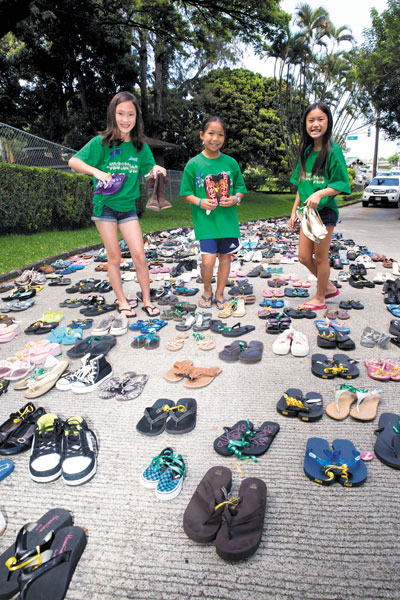Making A Statement With Slippahs
By Rachel Breit
Whether it’s collecting rubber slippers or conducting a bake sale, Oahu students reach out in support of others who’ve suffered abuse
Here in Hawaii, a sea of slippers outside an entryway is synonymous with a gathering of friends and family.
To honor April’s Child Abuse Awareness and Sexual Assault Prevention Month, a spread of slippers was lined up along the driveway and stairs leading up to the Children’s Justice Center (CJC) of Oahu.
The center, located in Nuuanu Valley, was established in 1986 under the Hawaii State Judiciary to provide a neutral, child-friendly setting for police and social workers to coordinate comprehensive forensic interviews of children to determine what happened.
Children who visit the center are suspected victims of sexual abuse, severe physical abuse or witnesses of violent crimes, such as homicide or domestic violence. The team of professionals (including Child Protective Services and HPD) assists with crisis intervention, determines an individualized plan of support for the child, and provides hope and comfort.
“We try to minimize trauma and help (victims) know people care about them despite some very difficult situations that are happening,” says Jasmine Mau-Mukai, director of the five CJC centers statewide.
More than 500 pairs of gently used and new slippers and shoes were donated to represent the 500 to 1,000 children who pass through the center each year.
While other CJCs across the nation collected different objects to represent their child victims (handprints, paper butterflies and hundreds of desks with empty chairs, for example), slippers were chosen since they are distinctly local.
“Anyone can relate to slippers outside a house, and this is a big, old house,” Mau-Mukai says of the center.
The slippers represent children walking up the stairs, says Emma Nitao, who along with her Leahi Green soccer teammates made up of 13 fourth-graders from various schools, collected many pairs over the course of six weeks. Nitao was inspired “to help the children and let them know that they are not alone.”
Miya Haga called up her family and friends asking for shoes, gathered them and tied them together so they wouldn’t get separated.
Raine Baptist amassed about 20 pairs.
Despite not fully understanding what sexual abuse is, the soccer team wanted to show the victims of the center their support. Friends of the Children’s Justice Center, Missing Child Center Hawaii, Girl Scouts of Hawaii, several schools, a hula halau and Scott Hawaii also participated by donating or collecting slippers.
Kamehameha sophomore Kaili Perez showed her support in the form of a large, colorful, polka-dotted check. Perez woke up early, baked for hours, accompanied her parents to their offices to sell her baked goods – all during her spring break – and raised $600.
Encouraged by her English teacher to go into the community and make as big a difference as she could, Perez exceeded her goal of $500.
“I like to help youth, like my mom. I asked her to think of different organizations that I could help. CJC came up and I thought I’d help them,” says Perez. “I love to bake, so I thought that I would use my skills to help a cause.”
Besides helping a cause financially, the participants also raised awareness of the sensitive topic of child abuse.
“Child abuse is an issue that doesn’t just impact those of us who are in government or charged with responding to child abuse,” Mau-Mukai explains. “This is really a community issue, and having the Leahi soccer team step up is really showing that kids can make a difference, too. Every time we do a public event, someone will call or come up and say, ‘You know, it happened to me. It happened to me when I was 6, and I never told because I was shame. I was embarrassed. I was afraid of what was going to happen. Are they going to believe me, or are they going to believe this person who everybody loves?’ – because it is frequently not the person you’d think (not someone) with a criminal history.”
The center plays a crucial role, both in supporting children and those who work in the interest of the children.
“Without the support of the center,” Thalia Murphy says, “it would be very difficult for me to remain in this field.”
As a deputy prosecutor for the City and County of Honolulu, Murphy seeks justice for children after a police investigation has taken place. Murphy has prosecuted child sex-assault cases for 25 years, and owes it to the CJC for continuing to be able to do so day in a day out. CJC provides training and support for professionals in the field.
“It means a great deal to all of us,” says Murphy of the center.
The slippers and shoes, by the way, were donated to the Institute for Human Services.
Monetary donations go toward providing child victims with food, stuffed animals and other comforts – things to help them heal, says Mau-Mukai.
The CJC welcomes any questions or concerns, and can be reached by calling 534-6700.







